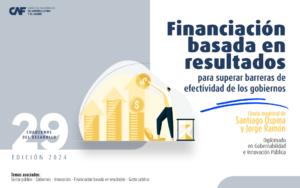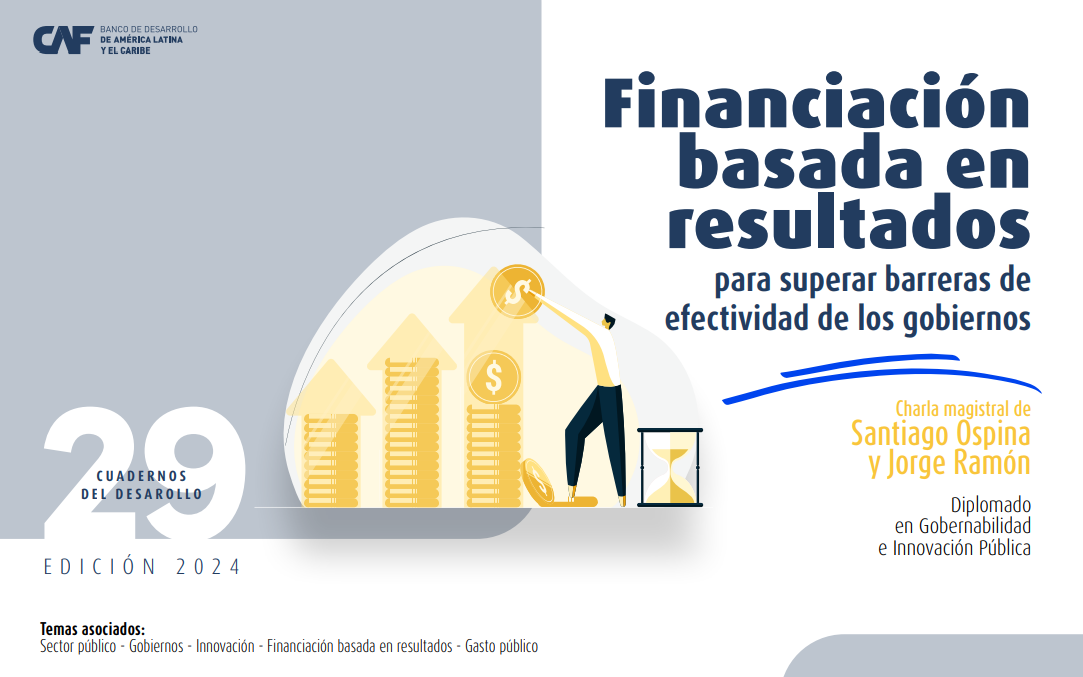The Masterclass, led by our Senior Manager, Jorge Ramón, and Project Manager, Santiago Ospina, sought to explore Results-Based Financing as a tool to optimize the effectiveness of public spending in Latin America and the Caribbean. The session was delivered to civil servants from 20 Latin-American governments seeking to learn from innovative mechanisms to address systemic constraints within public policy design and implementation.

April 14th, 2025 | Bogota. As part of Instiglio’s work on government partnerships, which focuses on strengthening public sector effectiveness by embedding results-based approaches into government systems and service delivery, a fruitful collaboration was carried out with the CAF to advance knowledge on effective public spending. As part of CAF’s Governability and Public Innovation Diploma, Instiglio was privileged to be invited to deliver a Masterclass on the role of Results-Based Financing (RBF) mechanisms in boosting public sector effectiveness. As a result, the CAF repository has recently published a knowledge piece summarizing the session. The 29th Cuaderno del Desarrollo recaps the key points and takeaways of the Masterclass, and it’s testament to the potential success of empowering and inspiring local civil servants.
Jorge Ramón and Santiago Ospina led the session, drawing from their extensive experience working with governments, philanthropic organizations, and multilateral institutions across the region. They highlighted how RBF can serve as a powerful tool to address institutional challenges and enhance the impact of public spending on social initiatives. The Masterclass brought together a diverse group of public servants from 20 countries across Latin America and the Caribbean, all eager to explore innovative strategies for strengthening governance.
As the landscape of international aid and funding changes, fostering local agency has never been more critical. Spaces like this not only provide opportunities to elevate new financing mechanisms for public initiatives but also create platforms for government officials to connect, exchange ideas, and build a regional network focused on financial efficiency and social impact. Strengthening these cross-border collaborations enables local governments to take the lead in structuring expenditures, enhancing autonomy, and driving development through smarter public investment.
Instiglio’s Role in Shaping Effective Public Spending
Jorge and Santiago delved into how RBF can be applied across various sectors, from education, climate, migration, and health, and how these approaches can maximize the impact of public investment.
The session covered three key areas:
– A review of how effectively the public sector currently spends money,
– Challenges facing government programs, and
– An introduction to Results-Based Financing (RBF) – including how it works, what makes it successful, and the benefits it can deliver.
This outcome-oriented approach challenges traditional financing models that often fund projects without clear accountability for results. Instead, RBF mechanisms offer a structured framework to ensure that the intended outcomes—whether it’s improving literacy rates or reducing poverty—are achieved, thus increasing the return on public investments.
A key highlight of the Masterclass was the presentation of three case studies regarding Instiglio’s work in the region. The youth workforce empowerment program in Costa Rica, local and regional education programs in Peru, and local employment programs in Bogota. These cases provided insights into how Instiglio’s model has supported governments in navigating barriers they face in achieving effective public investment. In regions where corruption, inefficiency, and a lack of data can undermine the success of social programs, Instiglio’s approach—centered on rigorous data analysis, transparency, and accountability—offers a blueprint for achieving better outcomes with fewer resources.
Addressing Regional Challenges with Local Responses
Governments across Latin America and the Caribbean often face the dual challenges of managing limited financial resources while addressing pressing social issues such as poverty, inequality, and inadequate access to public services. Santiago Ospina and Jorge Ramón discussed the specific hurdles that hinder the efficient use of public funds in the region, including weak institutional capacity, political instability, and a lack of trust between governments and citizens.
To tackle these issues, the class underscored the importance of leveraging data and evidence-based solutions. By setting clear performance metrics and ensuring that funding is contingent on results, RBF mechanisms help build trust and foster a culture of accountability. The use of third-party evaluators and independent audits ensures that funds are directed toward initiatives that are truly delivering results.
The Masterclass also created an opportunity to do a call to action for Latin American and Caribbean governments to adopt these innovative financing models and to rethink the ecosystem of Latin American and Caribbean civil servants. By evaluating how civil servants operate within the ecosystem, governments will unlock regional government collaboration practices to be able to respond and adapt to the changing funding landscape and will be able to move forward with ongoing projects that have been left pending due to international aid cancellation.
By embracing innovative financing mechanisms like RBF and strengthening the preparation of local government officials, Latin America and the Caribbean can pave the way for more effective public spending, ultimately driving sustainable development and improving the lives of millions beyond the available resources.
To read a recap of the Masterclass visit the Cuaderno del Desarrollo 29 on the CAF’s Scioteca repository.
